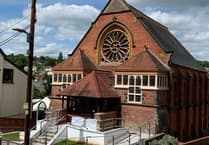THE service at Crediton Methodist Church on Sunday, August 25 was led by Rev David Greenwood and he used hymns, both sung and spoken, to speak about the Communion which we shared later in the service.
The reading from John’s Gospel spoke about Jesus saying he was the Bread of Life and anyone who eats His flesh and drinks His Blood would be saved.
The Old Testament reading from Leviticus 17 was entitled “Eating Blood is Prohibited”.
David said when England won the World Cup in 1966 footballers received a salary, were not millionaires and did not stay in luxurious hotels.
The team from North Korea had not left their closed communist country before. The players found lodgings in a convent near Middlesborough.
The single rooms were very bare, with just a bed, desk, chair and a crucifix.
Next morning they came down to breakfast not having slept because they were petrified by what sort of a place they were staying in - all they could see was a man being tortured.
They were shocked and fearful for their own safety. Of course, we are so used to seeing the crucifix and know what it stands for.
In the Gospel reading the disciples could not understand the teaching that you should “eat my flesh and drink my blood”.
In Leviticus the Israelites were told not to drink blood or even eat rare meat because it is life.
Jesus offers His life, His blood, His flesh and we do not recognise actually how shocking it was when He first said it.
Jesus wants us to share in His body and His blood by celebrating Communion and if we eat His flesh and drink His blood we have new life. God with us Emmanuel.
Blood is abhorrent to us but is atonement. You have to say sorry. Hebrews took a dove, or a lamb, or (if they were very rich) a whole cow as a sacrifice.
The priest killed the animal and sprinkled blood over the people as a sign of forgiveness. We do not come to receive Communion because we are good, but because we know we are not good enough and because the blood and flesh are signs we are forgiven.
So when we come forward to receive Communion we are recognising what we are and what we want to be.
It is a moment not when God is actually closer than usual, but when we recognise that God is closer than usual.
The question for us then is what happens next? When we leave church and God is close to us, how does it affect us for the rest of the day, tomorrow and the rest of the week?
If we are in God and God is in us, what does that mean for our own life? We are coming together recognising God in each other.
So we came forward to receive the Bread of Life and to drink of His sacrifice as a sign of our bonds of love at the table of the King.
Bronwyn Nott




